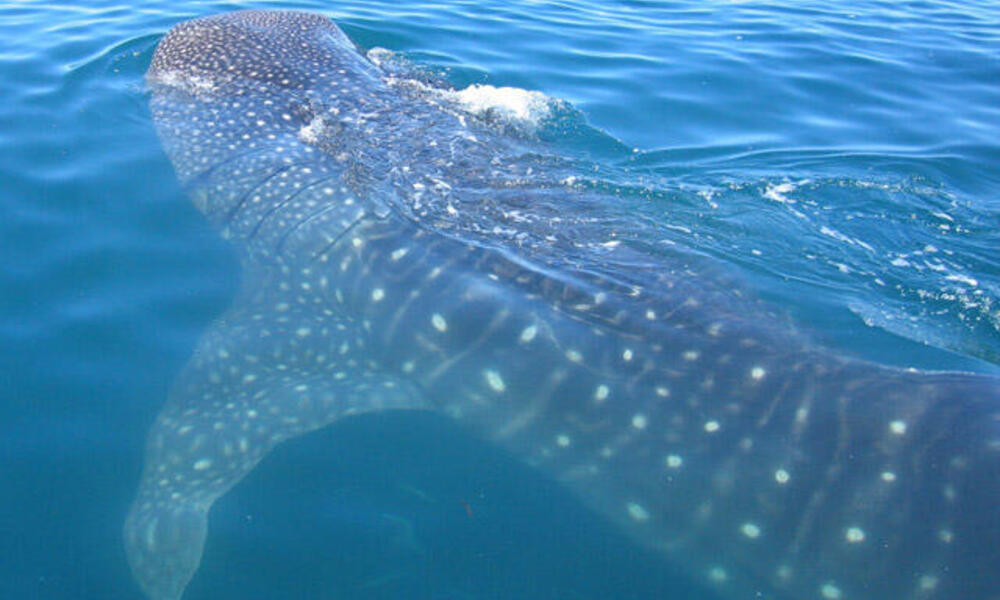
He referred to the importance of joint work to develop solutions and recommendations and take appropriate decisions to protect these species from risks and challenges, in order to achieve what everyone aspires to preserve whale sharks as one of the important wild animals.

HE Minister of Environment and Climate Change noted the importance of convening such regional forums, which are a platform for consultation between regional and international partners to highlight international efforts to protect marine biodiversity, transfer knowledge and exchange opinions, ideas and viewpoints through discussion sessions and research papers presented, pointing out that this forum supports the coordination of efforts between partners, and contributes to developing a common vision on the most important challenges and risks facing this rare type of whale. This provided the important infrastructure for developing plans to protect it and preserve its life within the Qatari territorial waters. His Excellency indicated that the average number of them, according to the most important statistics, reached about 600 whale sharks, pointing out that no higher number has been documented anywhere else in the world, in addition to information on the lifestyles of this organism and its surrounding environment. HE Minister of Environment and Climate Change stated that within the framework of the State of Qatar's keenness to achieve its National Vision 2030, especially with regard to the fourth pillar concerned with environmental development, the Ministry has conducted research and studies related to biological diversity, including the study that was conducted in 2010, which included several regions, under the supervision of a group of scientists and specialists, where it documented the intense presence of whale sharks in Qatar, and revealed that the Qatari territorial waters witness one of the largest concentrations of these fish, specifically in the Al-Shaheen field in the northeastern region of the country's waters. His Excellency reviewed the country's efforts over the past years, adding that Qatar has launched the National Environment and Climate Change Strategy (QNE) 2030, and has also prepared Qatar National Biodiversity Strategy and Action Plan for the Conservation and Management of Marine Resources, and the preparation of maps of coastal areas and maps of benthic habitats of environmental importance, as well as updating and issuing legislation and laws that protect the marine environment and criminalize harming its biodiversity, in addition to working to increase the area of marine reserves to 30 percent of the exclusive economic zone of the State of Qatar. His Excellency pointed out that preserving marine life of all kinds and working to protect it plays a prominent role in preserving the marine environmental balance, which reflects positively on all the inhabitants of the earth. Faleh bin Nasser bin Ahmed bin Ali Al-Thani affirmed that the organization of the forum was based on the ministry's responsibilities with the international community in protecting the environment, and as a complement to the State's active role in preserving marine life and the important biodiversity it contains, pointing out that the ministry seeks to hold the forum periodically in coordination with the concerned international and regional bodies.

In his speech during the opening of the forum, HE Minister of Environment and Climate Change Sheikh Dr. The research presented also included modern technologies used to track its migration patterns. The research papers reviewed a number of topics related to preserving the whale shark, the factors affecting its life and some of the risks it faces, and studies of its migration patterns in the seas and oceans. Three main sessions were held in the forum, during which 18 research papers were presented, with the participation of more than 11 local, regional and international experts and researchers. Doha, May 22 (QNA) - Qatar whale shark conservation forum 2023, organized by the Ministry of Environment and Climate Change (MoECC), in partnership with the United Nations Educational, Scientific and Cultural Organization (UNESCO) kicked off Monday and lasts for two days, at the Aquatic Fisheries Research Center in Ras Matakh, north of Qatar.


 0 kommentar(er)
0 kommentar(er)
